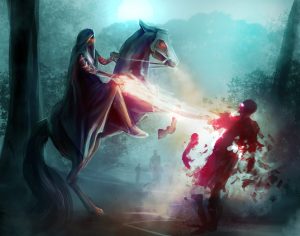Ah, the burden of being a writer. There are many writing pitfalls you can fall into if you aren’t careful, and even the most practiced and accomplished writers slip sometimes. But when you look out for these common mistakes, it’s much easier to prevent yourself from making them.
This article features some of those common fiction writing pitfalls to look out for in your writing journey, as well as some tips for avoiding them.
Disclaimer: Writing is always subjective. This advice will not apply to every single situation ever, especially if you write experimentally and like using or subverting common tropes or writer habits. Take everything with a grain of salt, as they’re just meant to be writing pitfalls you may be able to recognize in your own work and realize, “Hey, I do this a lot and my writing actually feels better when I don’t do it. Let me stop that.”
Let’s begin.
Hitting Readers With The Dreaded Exposition Dump
I see this time and time again with all sorts of writers, from the brand new to the celebrated veteran.
You as the writer already know everything there is to know about your world. You built it, after all. And there’s a good chance you’re very passionate about it, and that you’ve put countless hours and many journals filled with notes and scratched out pages into developing a super complex and unique setting. Even if you’re writing a fictional piece that takes place in the real world, you’re still worldbuilding by immersing us in the setting you chose.
So it’s no surprise that you would want to share every detail with the reader. The problem is (and this will sound harsh): the reader doesn’t care. At all.
That’s not to say that they’ll never care; just that your biggest priority is hooking them in first. If you hit them with a giant exposition dump about what your world and characters are like without giving them a reason to want to know, they will group you in with literally every other [insert your genre here] book in existence. They won’t see the love and care you put into building your world, because you dumped it all on them without letting them experience it themselves. Remember: the reader doesn’t have the same connection to the work you poured your heart and soul into as you do. You have to make that connection.
To avoid the dreaded exposition dump, ask yourself this: what does the reader need to know right now? And how can you deliver that information to them naturally without making them feel like they’re studying a history book about a world that doesn’t even exist?
For example, perhaps your fantasy novel currently starts off by explaining everything there is to know about your world. You basically dedicated an entire (pre)chapter to providing a recap of your world, your protagonist’s life, and how they got to where they are now. But the reader has no reason to care about your protagonist yet. Telling them, “ten years ago, her parents were cruelly murdered by the evil regime, and now she is out for revenge” will not impress them. Lots of fantasy protagonists lose their parents. Lots of protagonists are motivated by vengeance. What the reader wants to know is what makes your protagonist’s situation unique, and what makes them worth rooting for.
So instead, start off by putting your protagonist in a situation that allows readers to put the pieces together themselves. It doesn’t have to be a high stakes situation right off the bat. Just something to give readers a taste of your world, your protagonist, and the kinds of obstacles they might be up against.
Not Trusting Your Reader (or Yourself)
Several of the points here are similar, and here’s why: readers don’t like reading stuff they already know, or don’t feel they need to know.
Trust your own skills as a writer, and trust the reader’s intelligence. If done right, you don’t need to hold your reader’s hand through the important plot points or moments of realization for the characters. Having big moments explained in excruciating detail when the reader already understands what’s going on will only kill the tension at best and, at worst, annoy them.
This is true for smaller moments as well, and goes hand-in-hand with the exposition dump and other points we’ll cover in this article. For example, the reason a character did something does not need to be explained to a reader. You shouldn’t need to give context for why something is happening, unless you intentionally kept it vague up until that point. For instance, if a character is insulted and gives the other person a dirty look, don’t write it as, “[Character] gave [other person] a disdainful look, deeply offended.” We know they’re offended, my guy. Cut the extra shit out. We don’t need it.
You are a writer, and worthy of the title. Don’t second guess your own writing. Trust yourself!
Prioritizing Worldbuilding Over Plot and Characters
Fantasy and sci-fi writers, I’m lookin’ at you.
Look, I’m right there with you. I love worldbuilding. I’m absolutely obsessed with building character profiles, fun tidbits about the world, historical events, major nations and their respective cities, magic systems, and so on.
But be honest with yourself: you’re procrastinating. Maybe you’ve got a case of writer’s block, and you’re using your worldbuilding as an excuse to delay getting on with the actual story. And, as discussed when talking about the dreaded exposition dump, the reader doesn’t care about your worldbuilding right away. Not until you give them a reason to.
Even when you start writing, sometimes it may be hard to ease up on the worldbuilding, causing you to neglect developing your characters and building an interesting, cohesive plot. Readers will notice this. You can build the most beautiful, fascinating world ever created, but if there’s nothing actually happening in that world, readers won’t get the chance to love it the way you do.
My advice for dealing with this particular pitfall is to try incorporating the worldbuilding you’re fixated on into the outline. How does it fit? Does it fit at all? Can you use it somehow? If you’re stuck on a plotline or a particular scene, how can you utilize the pages upon pages of information about your world that you’ve created to keep the plot moving?
Simply put, determine how your worldbuilding will come into play within the plot, so that you’re effectively both worldbuilding and outlining at the same time.
Not Sticking to Your POV (Unintentionally)
A simple, but very common writing pitfall, and one I’ve fallen into myself many times before.
If your story is in first person, stick with first person. If your story is in third person, stick with third person. If you decide to switch POVs intentionally, that’s totally fine and up to you, but I’ve seen many instances of the POV changing to third person totally randomly for a single paragraph. It’s jarring and may throw your reader off.
The same is true for tenses. The most common mistake I see writers make is that they’re writing a story in past tense, but randomly switch to present tense, or vice versa. Unless some kind of reflection or memory is happening, there’s no reason for a present tense story to switch to past tense out of nowhere. If you’re going to tense or POV switch, be intentional with it. Make it clear, so that your reader doesn’t think you just messed up.
My best advice for avoiding this particular pitfall is taking a moment to read the last few pages or so of your story if you haven’t worked on it in a while. It’s easy to lose consistency when you’re not in the zone. It can also help you realize that maybe the POV you chose for the particular story isn’t the right fit. Maybe you wrote in third person but realized that the voice of your protagonist is important, and you want readers to be inside their head, so you switch to first person. Or maybe you don’t want to be limited just to your protagonist’s perspective, so you switch to third person. Thinking carefully about your goals for your story and how you want to tell it can help you avoid accidentally switching POVs or tenses because the way you’re writing just isn’t doing it for you.
Breaking the Rules of Your Magic System
I’ve made it clear before that I love soft magic systems. It’s certainly not a writing pitfall in and of itself. But it’s also worth mentioning the dangers of the magic system, whether you’re writing a soft magic system that doesn’t follow any particular set of rules (in which case, you have more leeway), or a hard magic system with a clear set of rules and limitations.
A common pitfall unique to fiction writers is writing yourself into a corner because of the superpowers you gave your characters. If your character is facing some unstoppable evil, but you gave them limitations that keep them from using magic to defend themselves, oftentimes writers solve the problem in a way that doesn’t solve it at all: they break the rules.
If your character can stop time, but they need to have a special amulet or some kind of ingredient on their person, you are cheating the readers and the story by suddenly giving them the ability to stop time without aid, with nothing in the plot previous to this leading up to this sudden boost in abilities. Similarly, if you make your character super powerful (overpowered, if you will), but you limit them when it’s convenient to your plot, your scheming will not go unnoticed.
Be careful when deciding what abilities your characters have. If you make them super powerful, make their problems unique to them in a way that makes it so they can’t easily magic their way out of it. If you’ve screwed them over by denying them their magic when they really need it, punish them. Use it as an opportunity to show the reader how scary the villain is, and how much it sucks to be caught unprepared.
Purple Prose and No Plot
Maybe I am biased, as I am not a big fan of prosey writing in general. But dear god, stop with the purple prose.
We don’t need two pages describing what a cheesecake looks like, and a million metaphors comparing it to clouds and heaven and cotton balls. If it’s your thing to write very prosey, more power to you. But if you’re in the querying trenches trying to snag an agent for a commercial fantasy, you are not doing yourself any favors by riddling your story with needless prose. Agents and editors catch onto that real quick, and you do not have many pages to work with if you’re trying to hook them. Seriously. You get like 50 pages, max. Don’t fill it with unnecessary prose describing how the witch’s robes flow like a river of black, billowing in the wind and shimmering in the moonlight like a million little diamonds.
Readers can recognize useless filler from a mile away. Don’t clog their brain meat with it.
No Sentence/Paragraph Variance
One of the most common writing pitfalls that I see time and time again is also perhaps the easiest to miss.
If being a writer wasn’t hard enough—writing an interesting plot, an engaging world, lovable (and/or hateable) characters, with a voice that doesn’t bore readers to tears—you also have to do it all through sentences that are artfully structured in a way that doesn’t make the reader feel like they’re reading in monotone. An interesting plot can only go so far if every sentence is an absolute slog to get through.
But what is sentence variance? And how do you make sure your sentences are well-structured and varied?
I always credit my understanding of sentence variance to Gary Provost’s quote on sentence structure:
“This sentence has five words. Here are five more words. Five-word sentences are fine. But several together become monotonous. Listen to what is happening. The writing is getting boring. The sound of it drones. It’s like a stuck record. The ear demands some variety. Now listen. I vary the sentence length, and I create music. Music. The writing sings. It has a pleasant rhythm, a lilt, a harmony. I use short sentences. And I use sentences of medium length. And sometimes when I am certain the reader is rested, I will engage him with a sentence of considerable length, a sentence that burns with energy and builds with all the impetus of a crescendo, the roll of the drums, the crash of the cymbals–sounds that say listen to this, it is important.
So write with a combination of short, medium, and long sentences. Create a sound that pleases the reader’s ear. Don’t just write words. Write music.”
-Gary Provost
I’ve found it most helpful to avoid making my writing sound boring and monotonous by reading my work aloud. It might feel weird at first, but it is incredibly helpful, not just for finding errors or clunky phrases, but for finding the rhythm in your writing as well.
Too Passive, Too Passive
Passive voice has its uses, friends, but when you’re writing a story, it can often be a sign of weak or timid writing if you use it too often. Not to mention, it’s also often a contributor to a lack of voice, because your protagonist doesn’t come across as, well, active. When a character performs an action, don’t beat around the bush.
Let’s write a quick fantasy sentence to show you the difference:
Passive: The magic was absorbed by the wizard.
Active: The wizard absorbed the magic.
If we’re focused on what the wizard is doing, we want to get straight to the point. The wizard absorbed the magic. Boom, done.
“But, Brioche,” you might say, “aren’t there moments when we want to be passive instead of active?”
Excellent question! As mentioned, the passive voice does have its uses, particularly for when you want to emphasize a subject that isn’t the character. If we take the example above, what if we want the magic to be the focus instead of the wizard? What if the magic is incredibly important and it’s an absolute disaster that it’s been absorbed by this random wizard? In that case, even though it’s technically the wizard who is acting, and the magic being acted on, it would be better to use the passive voice because the magic is what we really care about.
Basically, decide where you want the focus, the action, to go. Usually, the focus lies with the characters and what they’re up to. So use active voice.
Bonus: Telling, Not Showing
I put this writing pitfall as a bonus because literally every writer ever has heard this advice at least once before, and I didn’t think it would be fair to y’all to waste a point on this article.
“Show, don’t tell.” It’s advice I consider extremely important, but also incredibly annoying to hear over and over again with no follow up, as if it’s the easiest thing in the world. I wrote an article recently on incorporating the senses into your writing as a way to help ease writers into “showing” instead of telling, but even then, it’s very subjective and not nearly as straightforward as people make it sound when they give you this advice.
If “show, don’t tell” is something you haven’t been told before, the basics of it is that your goal is to immerse readers in your world and engage them in your characters and plot without explicitly telling them how they should feel. For example, instead of telling readers that “the girl was sad,” show them evidence of how the girl is feeling so that we can feel that way right along with her (“the girl’s lip trembled, her eyes shining with unshed tears”). That is not to say that you should always show instead of tell. Sometimes the situation really does call for you to be straightforward and just tell us what’s up. A big part of growing as a writer is learning to recognize which is required in the moment, and finding a balance.
My advice for this writing pitfall is to pay careful attention to how the characters are reacting and feeling. In my experience, that tends to be where writers tend to “tell” when they should “show” the most. If we want the reader to feel some type of way, telling them right off the bat denies them any emotional connection. Same thing for settings. If we want to immerse the reader in the world, it’s not enough to just say, “the mansion was creepy.” You have to show us why it’s creepy. “The floorboards creaked, the wind whistling, the tree branches tapping rhythmically against the windows.”
Take a look at your writing and see if there are any scenes that don’t feel as strong as they could be. You might find that you had a habit of telling a little too much, without any showing.










